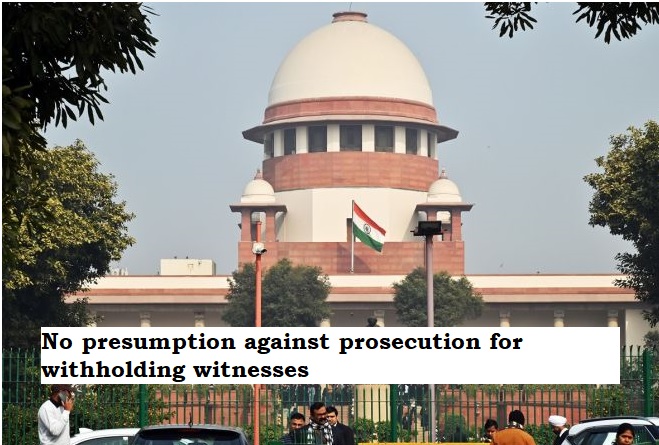


The Supreme Court, in its recent dismissal of a criminal appeal on December 13, delivered a nuanced perspective on the issue of withholding witnesses in criminal proceedings. The Court emphasized that the mere act of withholding witnesses should not automatically trigger an 'adverse inference' against the prosecution. This opinion challenges a simplistic presumption and underscores the importance of considering the totality of circumstances in each case.
The Court's ruling underscores a critical point – that in cases where eyewitnesses are not presented before the court, it does not necessarily imply guilt or a weakening of the prosecution's case. Drawing an adverse inference must be contingent upon a comprehensive assessment of the situation at hand. The Court recognized the need to delve into the specifics of each case, urging a careful examination of the circumstances before arriving at any conclusions regarding the credibility of the prosecution.
Addressing a specific concern related to eyewitnesses who happen to be close relatives of the deceased, the Court declared that their familial connection should not automatically render their testimony suspect. While acknowledging that such evidence might necessitate closer scrutiny, the Court maintained that familial ties alone should not be a ground for discarding their testimony outright. Upon subjecting the evidence to rigorous scrutiny, the Court found the eyewitnesses' version to be of exceptionally high quality, emphasizing the importance of the quality of evidence over its sheer quantity.
Building on this principle, the Court further expounded that the availability of independent witnesses not affiliated with the opposing parties could influence the drawing of adverse inferences. The prosecution's decision to omit the examination of independent witnesses, while relying solely on related witnesses, may lead to a justifiable adverse inference. The Court, however, cautioned against a blanket application of this principle, emphasizing that the quality of the evidence presented remains a pivotal factor. When the evidence from eyewitnesses is of sterling quality, the Court asserted, an adverse inference need not be automatically drawn, reinforcing the idea that the merit of the evidence should guide such determinations.
The case in question involved the conviction of three individuals for the killing of the deceased and the assault on prosecution witnesses. The primary accused, responsible for fatally shooting the deceased, was convicted under Section 302 of the IPC. However, the other two accused, the appellants, faced convictions under the same provision read in conjunction with Section 34 of the IPC. The appellants pursued separate appeals, and the matter eventually reached the Supreme Court after the dismissal of the appeal by accused No. 3 in the Patna High Court.
One pivotal consideration before the Court was the disparity in the charges against accused No. 3, who faced only Section 302 of the IPC without the application of Section 34. In contrast, the appellants faced convictions under both sections. The Court deliberated on whether sustaining the appellants' convictions was justified in light of the main accused not being charged under Section 34.
The Court clarified that, in cases where Section 302 of the IPC applies, establishing common intention is sufficient to attract vicarious liability under Section 34. Even in the absence of a prior conspiracy or premeditation, common intention can be formed during the occurrence. In this specific case, where the fatal shot was fired by accused No. 3, Section 34 was deemed unnecessary for his conviction. However, the Court asserted that Section 34 was appropriately applied to the appellants as they shared a common intention with accused No. 3.
Consequently, the Court upheld the sentences imposed on the appellants and directed them to surrender before the Trial Court. Notably, the Court also considered the possibility of permanent remission for the appellants, specifying that their eligibility would be subject to the state government's remission policy.
In conclusion, the Supreme Court's decision not only underscores the importance of a nuanced approach to evaluating the withholding of witnesses but also highlights the significance of quality over quantity when assessing evidence. By providing clarity on the application of Section 34 in cases of common intention, the Court has contributed to the jurisprudence surrounding criminal liability. Additionally, the Court's mention of the potential for permanent remission reflects a broader perspective on the post-conviction considerations for individuals found guilty of criminal offenses.
TAGS: Supreme Court criminal appeal adverse inference withholding witnesses eyewitness testimony totality of circumstances